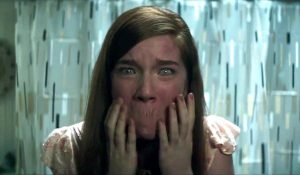 Ouija: Origin of Evil ★★★½
Ouija: Origin of Evil ★★★½
FOR some years, from the mid ’90s to early 2000s, horror films were few and far between at the cinema.
The straight-to-video release path dominated for the genre and it was rare to see larger budgets and wide distribution.
And then along came a couple of Australians and a renaissance started.
With Saw in 2004, James Wan and Leigh Whannell showed the studios there was cinema life left in horror.
Provided you identified the right, talented and committed people, capped the budget and truly gave them creative freedom, a healthy return could still result. Saw is now on its eighth sequel.
In 2005, brash American director Eli Roth again proved the formula could work with Hostel which spawned two sequels. Meanwhile, Wan became instrumental in helping start several other franchises over ensuing years, including The Conjuring.
The stage was set for a dedicated production house like Blumhouse which is now behind a huge share of the theatrical horror releases, including the Paranormal Activity, Purge, Insidious and Sinister franchises which have grossed more than $1.2 billion worldwide on combined budgets under $40 million.
All this is leading to the fact that we are getting more decent horror films at the movies with one of those being Ouija: Origin of Evil from 2016.
The first film, released in 2014, was just ok, but for the sequel they switched creative talent and Mike Flanagan took over as director, editor and co-writer and does an exceptional job.
As is the formula, Flanagan is a young up-and-comer but he already three films under his belt, Absentia, Oculus and Hush, all of which have been not-worthy with the genre’s critics.
The origin sequel, like the recent Conjuring and Annabelle instalments, benefits greatly from being a period piece and the resulting locations, fashions and sensibilities in the scripts.
It’s 1967 Los Angeles and widowed mother Alice (played by Elizabeth Reaser) supplements income for her and her two daughters, Lina and Doris, by conducting seances and readings at their suburban home.
Of course these are a scam, aided and abetted by the involvement of her two daughters, the youngest of whom, Doris, just thinks it’s a lot of fun.
There is a serious side to the activity in that Alice genuinely believes in the possibility of contacting loved ones from the hereafter, in particular her former husband whose loss is still felt heavily by the family.
What the film does very well is quickly and expertly establish not just the family’s backstory but also the emotional bond between the three females that also engages the audience. They genuinely look, feel and sound like a typical fractured family doing their best.
And then the eldest daughter Lina (Annalise Basso) suggests they incorporate the latest craze, the Ouija board game, into their routine. Of course things get crazy after the youngest daughter breaks one of the game’s three basic rules – never play the game alone – and unleashes the shocking secret life of their house.
The rest is typical fare but done very well, with jump scares that use different parts of the frame and adjust the timing just that bit differently to ensure the desired shock. The back-story of the house when revealed is also creepily-effective.
The acting remains good throughout, aided by the fact that all the leads have played horror before. Particularly good are Annalisse Basso (Oculus) as Lina and young Lulu Wilson (Annabelle: Creation, Deliver Us From Evil) as Doris.
And then there is poor old Henry Thomas as Father Tom. He does a good job but nearly 50 movies into a career he will always be known as Elliott from ET.